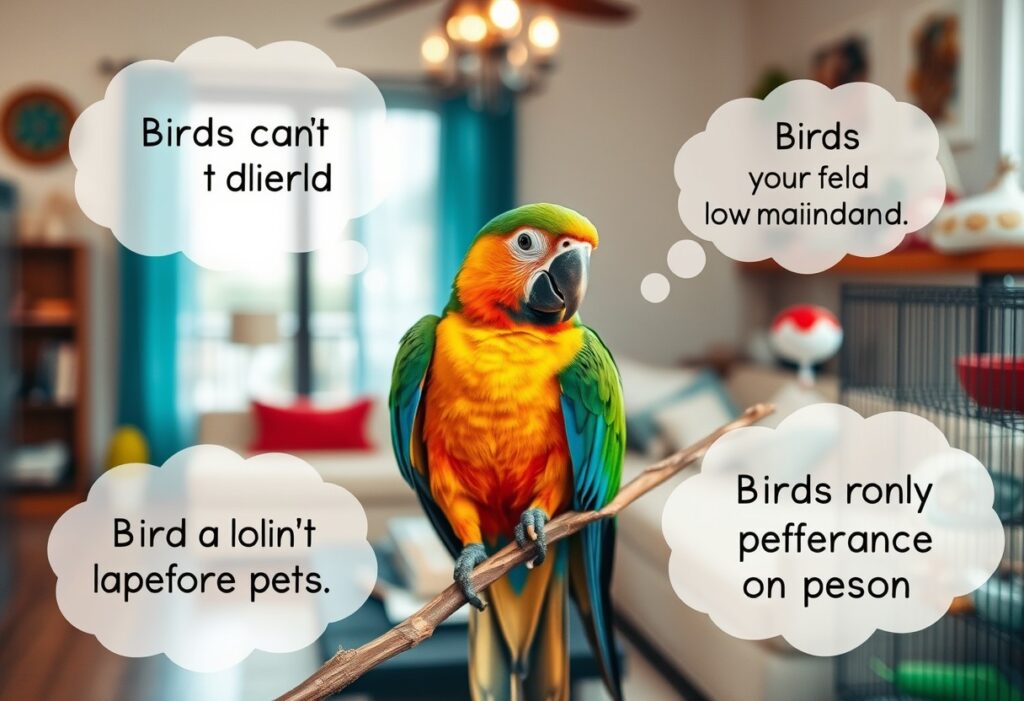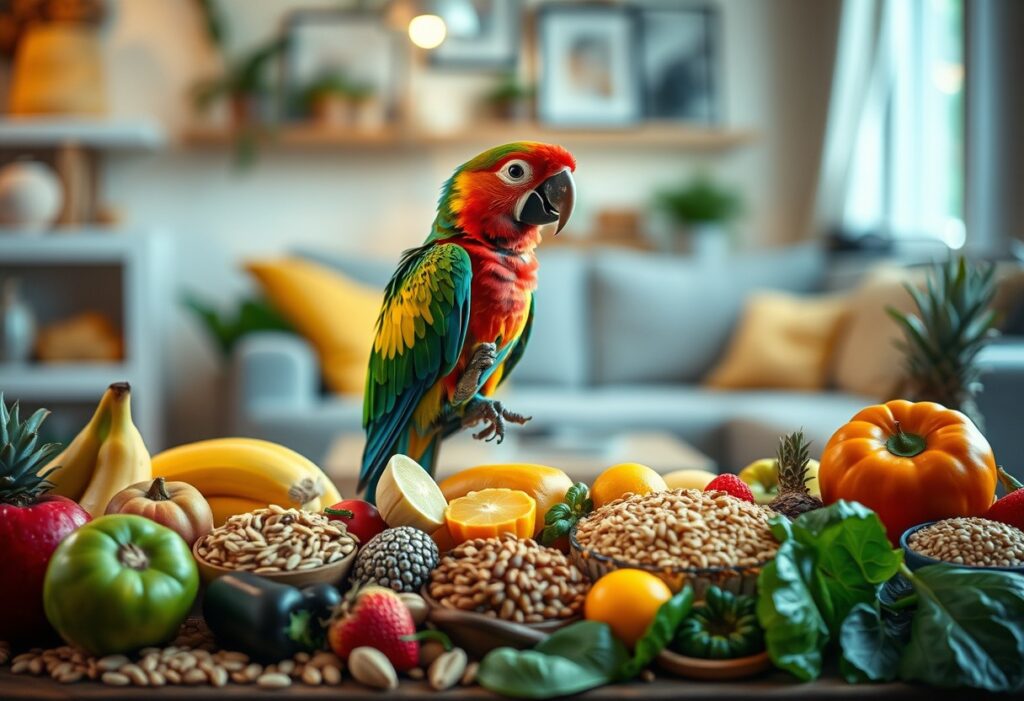Myths about pet birds often lead to misunderstandings that can jeopardize their health and wellbeing. You may believe that birds don’t require social interaction or that they can thrive solely on seed diets, but these myths may negatively affect your pet’s happiness. Understanding the truth behind these misconceptions is important for providing the best care for your feathered friend. Join us as we explore and debunk these common myths, empowering you to create a safe and nurturing environment for your avian companion.
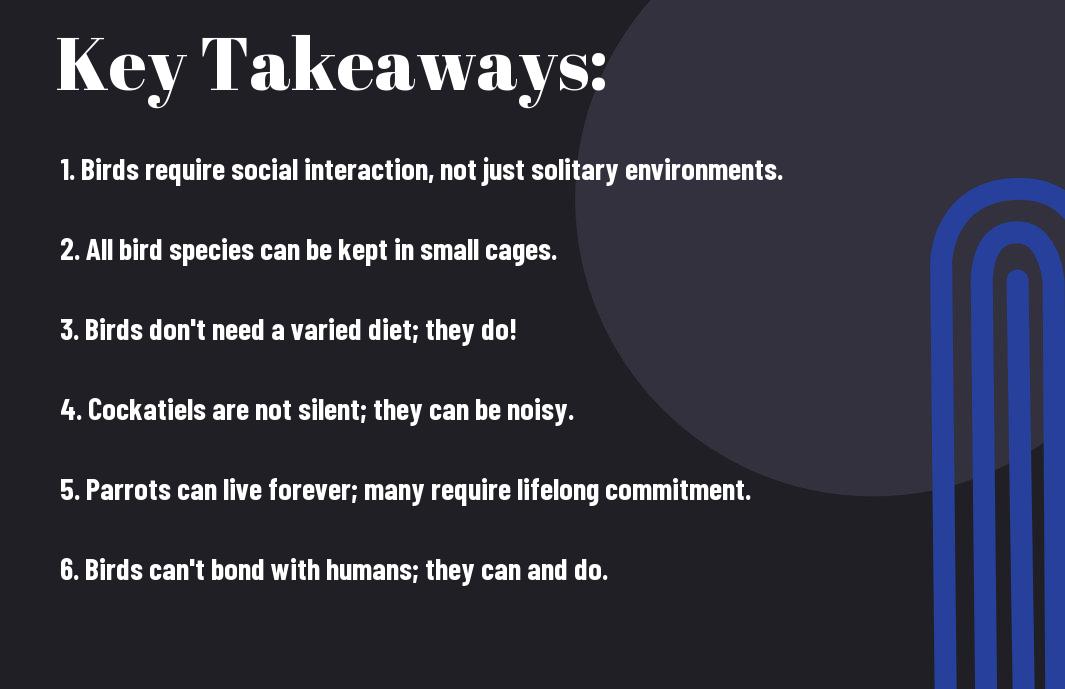
Myth 1: Pet Birds Are Low-Maintenance
For many potential bird owners, the allure of having a pet bird often stems from the belief that these creatures are low-maintenance. However, it is important to recognize that pet birds require just as much attention and care as other pets. While they might be smaller in size compared to dogs or cats, their daily care needs can be quite significant. You should expect to invest time in cleaning their living space, providing mental stimulation, and ensuring they receive adequate social interaction. Pet birds are social beings, often requiring companionship and playtime with you or other birds to remain happy and healthy.
Daily Care Needs
For your pet bird to thrive, you’ll need to dedicate time each day to fulfill their care requirements. This includes changing their food and water, cleaning their cage, and providing fresh toys and perches to enrich their environment. Your bird will likely want to come out of the cage for exercise and socialization, which means you’ll need to facilitate playtime and interaction regularly. Neglecting these daily needs can lead to behavior issues and health problems in your bird.
Nutritional Requirements
Myth: It’s easy to feed birds—just give them seeds and they’ll be fine. In reality, your pet bird’s nutritional needs are far more complex than that. While seeds can be part of their diet, they should not make up the entirety of it. Birds require a balanced mix of pellets, fresh fruits, vegetables, and occasional seeds. This balanced diet is crucial for preventing common health issues such as obesity and vitamin deficiencies.
Daily attention to your bird’s dietary needs is important for their overall well-being. It’s important to research suitable foods for your specific type of bird and make adjustments as needed to promote their health. In addition to proper nutrition, be vigilant about monitoring their weight and overall appetite, as sudden changes can indicate underlying health problems. A well-rounded diet and consistent feeding schedule will ensure your bird remains vibrant and active.
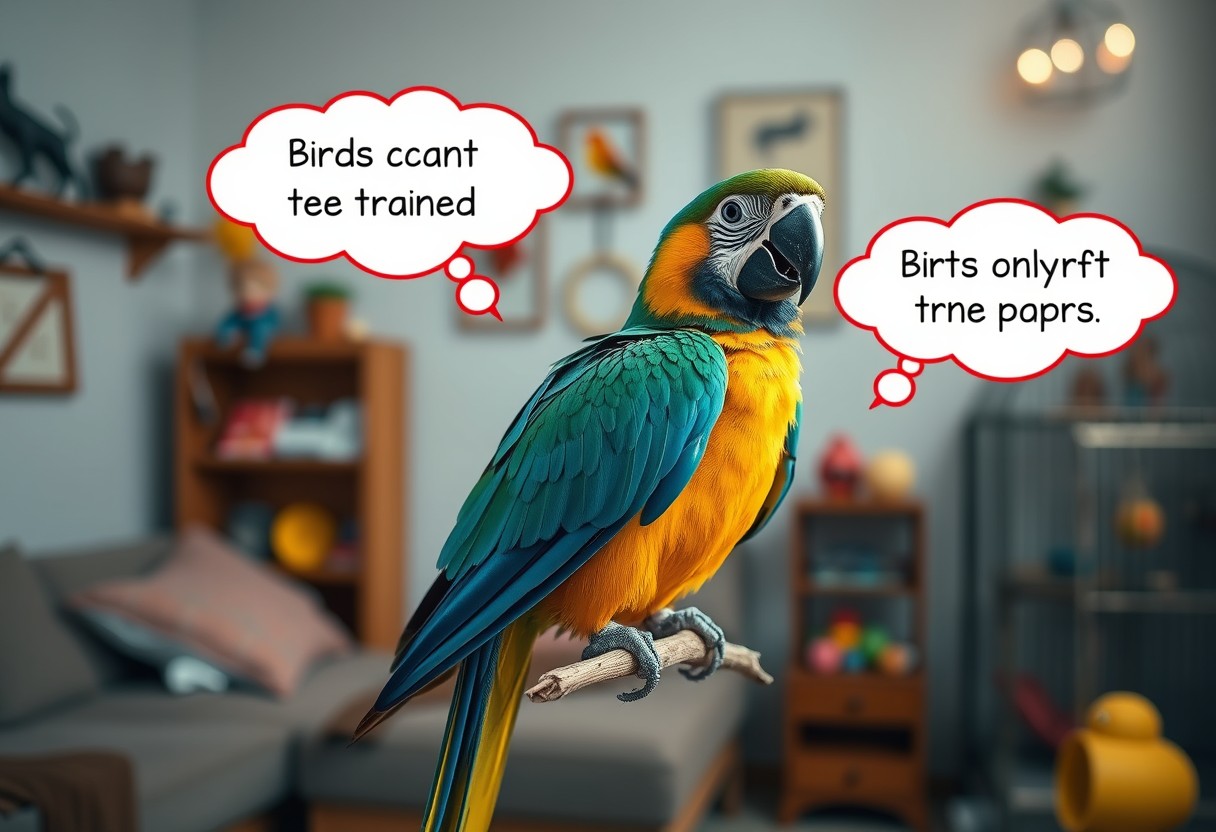
Myth 2: Birds Can’t Be Trained
It’s a common misconception that birds lack training potential. Many people believe that these feathered friends aren’t as intelligent as other pets and therefore cannot be trained. However, this notion is far from the truth. Birds, especially species like parrots, cockatiels, and budgies, possess a level of intelligence comparable to that of dogs and even some primates. With the right approach, you can effectively harness their natural abilities to learn and respond to various commands and tricks.
Understanding Bird Intelligence
An crucial factor to consider is that birds have complex cognitive abilities. They can solve problems, mimic sounds, and even understand simple concepts. For instance, parrots are known for their exceptional ability to mimic human speech, showcasing their understanding of communication. The more you engage with your bird, the more you will uncover their remarkable capabilities and adaptability.
Effective Training Techniques
The art of training your bird effectively is grounded in positive reinforcement and patience. Utilizing rewards, such as treats and praise, encourages your bird to repeat desired behaviors. It’s crucial to keep training sessions short and engaging, as birds have limited attention spans. Just like with any other pet, building a bond and earning your bird’s trust is crucial for successful training.
A variety of effective techniques can be employed to enhance your bird’s training experience. Start with simple commands and gradually work up to more complicated tasks, ensuring your bird is comfortable at each step. Consistency is key; you should establish a clear routine and use the same commands for each action. If your bird responds positively, celebrate the small victories! This positive reinforcement strengthens your bond and encourages them to continue learning. Always remember, patience is paramount—your bird may not catch on immediately, but with persistence, it can become a well-trained companion.
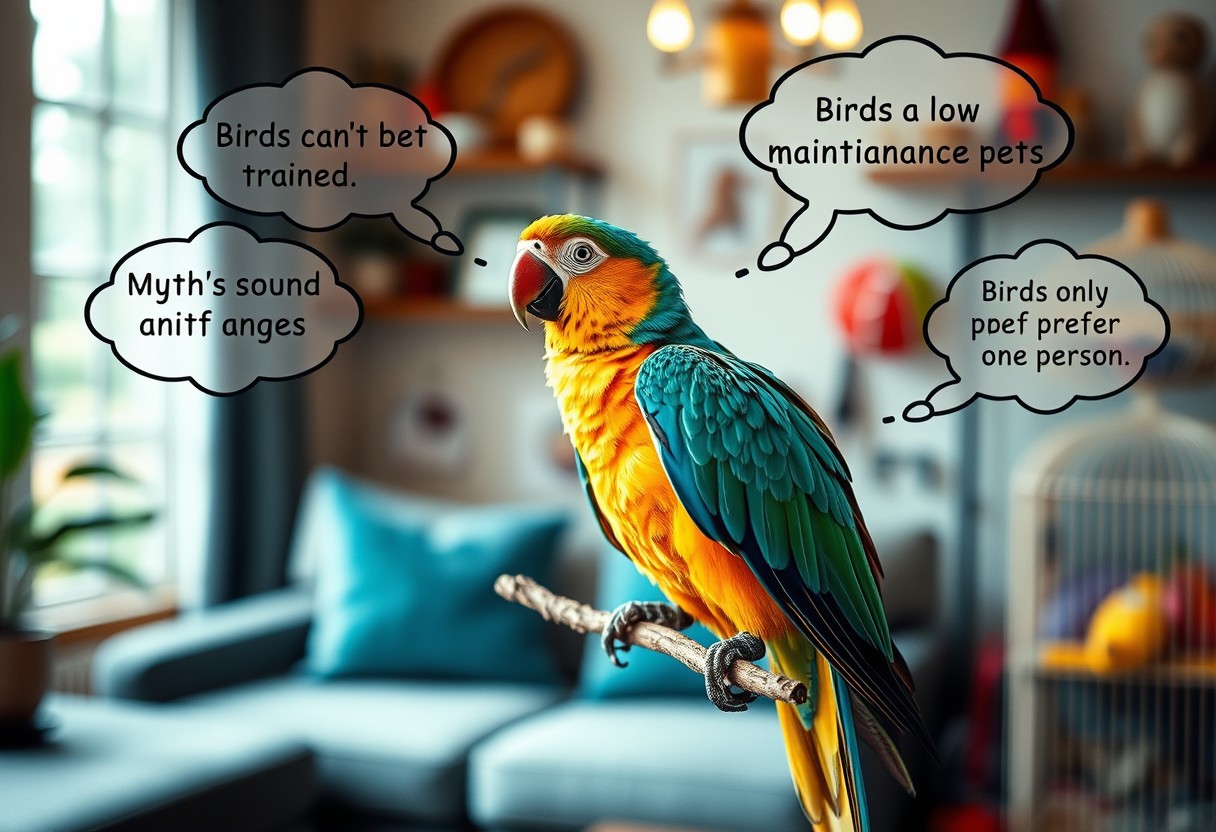
Myth 3: All Birds Are Noisy
To many potential bird owners, the idea that all birds are noisy can be a significant deterrent. However, this myth does not hold true, as the vocalizations of birds can vary greatly among different species. Understanding the diverse range of bird sounds may lead you to realize that a feathered friend doesn’t have to be a nuisance to your daily life. Some birds are naturally more chatty, while others prefer silence or soft vocalizations.
Vocalization Varieties
Vocalization varies significantly among bird species. While large parrots like African Grey Parrots or Macaws are known for their loud calls and mimicry skills, many smaller birds, such as Canaries and Budgerigars, can be quite moderate in their noise levels. In fact, while some birds engage in loud vocal displays, others will chirp softly or occasionally make gentle sounds without becoming a nuisance. Knowing the vocal trends of different species can help you select a bird that aligns with your lifestyle and preferences for noise levels.
Quiet Bird Species
Myth regarding the noise level of birds often leads to the misconception that they are all prone to loud sounds. In reality, there are several species that are renowned for their quieter nature, making them suitable companions for those who prefer a more tranquil environment. Finches, for instance, produce soft chirps that are generally soothing rather than disruptive, while Parakeets can also be relatively quiet if adequately socialized and stimulated.
Understanding the behavior of quiet bird species can play a crucial role in making an informed decision about pet ownership. Birds like Lovebirds or Bourke’s Parakeets may vocalize occasionally but often do so in a much softer manner compared to more vocal breeds. By educating yourself on the characteristics of various bird species, you can find a pet bird that complements your peaceful living space without incessant noise, dispelling the myth that all birds are loud and making your experience as a bird owner a joyful one.
Myth 4: Birds Can Live on Seed Diets
Your understanding of a pet bird’s dietary needs is crucial for its well-being. Many bird owners believe that a seed-based diet is sufficient for their feathered friends, but this is a common myth that can lead to serious health issues. While seeds can be part of a bird’s diet, they should not make up the entirety of it. A diet consisting solely of seeds can lead to various nutritional imbalances, putting your bird at risk for obesity, malnutrition, and other health problems.
Nutritional Imbalances
Diets high in seeds may provide plenty of fat and carbohydrates, but they often lack important vitamins, minerals, and other nutrients that your bird needs to thrive. For instance, seeds tend to be deficient in vitamins A, D, and E, as well as calcium and other crucial minerals. This deficiency can lead to serious health concerns, such as poor feather quality, weakened immune systems, and even organ damage over time.
Moreover, the high-fat content in many seeds can contribute to obesity, which further complicates your bird’s health. Being overweight can lead to additional issues, such as liver disease and diabetes, diminishing your bird’s quality of life. It’s critical to recognize that while seeds may be a satisfying treat for your pet, they should not dominate their diet.
Importance of Fresh Foods
Myth: Fresh fruits and vegetables aren’t necessary for my bird’s nutrition. In reality, incorporating fresh foods into your bird’s diet is important for maintaining its overall health. These foods provide the vital vitamins and nutrients that seeds simply cannot offer, helping to support your bird’s immune system, feather growth, and overall vitality.
It is crucial to offer a variety of fresh fruits and vegetables to ensure your bird receives a well-rounded diet. Leafy greens, carrots, apples, and berries are just a few examples of nutritious options that can enhance your bird’s diet significantly. Not only do these fresh foods provide important nutrients, but they also promote healthy foraging behaviors and mental stimulation, leading to a happier and healthier bird.
Final Words
On the whole, understanding the common myths about pet birds is necessary for providing them with the best care possible. By debunking these misconceptions, you can foster a more accurate perception of their needs, behaviors, and health requirements. It’s vital to recognize that pet birds require proper social interaction, mental stimulation, and a balanced diet to thrive in a domestic setting. Shifting your focus from outdated stereotypes to scientifically backed truths ensures that you create a nurturing environment where your feathered companion can flourish.
As you journey through pet ownership, remember that knowledge is power. By educating yourself about the realities of having a pet bird, you empower both yourself and your feathered friend. It’s your responsibility to challenge misunderstandings and advocate for better care, helping others in your community learn the truth about birds as pets. In doing so, you’ll not only improve your life with your bird but also contribute to a more informed and compassionate perspective on the joys and responsibilities of avian companionship.
Common Myths About Pet Birds Debunked
Q: Do pet birds require a lot of space and can they live happily in a small cage?
A: One common myth is that pet birds can thrive in small cages with little space. In reality, while some birds may adapt to smaller living conditions, providing a spacious cage is necessary for their physical and mental well-being. Birds are naturally active creatures that need room to fly, exercise, and explore. A larger cage allows them to spread their wings, engage in natural behaviors, and reduce the likelihood of stress and health issues. Ensuring that your pet bird has adequate space to move around will contribute to a happier and healthier life.
Q: Are all pet birds noisy and disruptive?
A: Many people believe that all pet birds are overwhelmingly noisy, but this is a misconception. While certain bird species, like parrots, may be vocal and can create a significant amount of noise, others, such as finches or canaries, are relatively quiet. The noise level depends significantly on the species of bird, its personality, and its environment. With proper training, socialization, and enrichment, birds can learn to vocalize in a manner that is less disruptive. Understanding the specific needs and characteristics of the bird species you are interested in can help potential pet owners make informed decisions regarding noise levels.
Q: Can pet birds be left alone for long periods without social interaction?
A: There’s a popular belief that pet birds can be left alone for extended periods without suffering from loneliness. In truth, birds are social creatures that thrive on companionship and interaction, whether it’s with their human caregivers or other birds. While some birds can tolerate short periods of solitude, leaving them alone for long hours regularly can lead to behavioral issues, such as boredom, anxiety, and destructive habits. It’s important to dedicate time for daily interaction, mental stimulation, and socialization to keep pet birds happy and engaged. For those who work long hours, considering a second bird or ensuring ample playtime and engagement before and after work can help meet their social needs.
